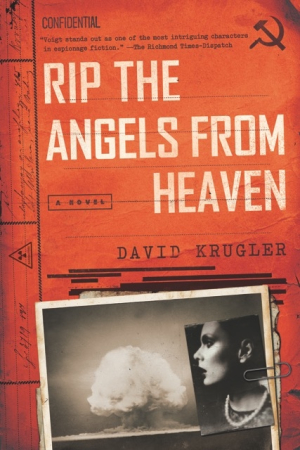Rip the Angels from Heaven
Cigarette smoke and Soviet spies mingle in Rip the Angels from Heaven, a wartime spy novel set in 1945. With the nuclear age on the horizon, Lieutenant Ellis Voigt must decide whom he can trust with the secrets that threaten his life.
Rip the Angels from Heaven is packed with blackmailers, red herrings, and double agents. Voigt, carrying information that is key to finishing the atomic bomb, finds himself caught between America’s Naval Intelligence and the Kremlin’s undercover spies. The FBI thinks he’s a murderer, and the Soviets want to extract more secrets from him—with an ice pick. Voigt, on a mission to New Mexico, faces trouble from both inside and outside his organization: “digging into my past, field agents would snuff and paw relentlessly.” Voigt, ever defiant, presses on, but he knows he’s only got a little time. Will he choose his own safety or stop the Soviets from getting the bomb?
Rip the Angels from Heaven is a hard-boiled delight, from its chain-smoking hero to its wartime lingo. Author David Krugler, a professor of history, has created a rich, sultry world of bureaucratic crime. His protagonist is tough and canny, with a criminal streak that makes his character irresistible. Voigt may worry about looking “awful hinky,” but he has bigger fish to fry. “The Russians never forgave and they never forgot. Just ask Trotsky,” he reflects. Voigt’s gallows humor keeps heavier scenes moving while also acknowledging what’s at stake if he cracks under pressure.
Krugler’s latest novel has a five o’clock shadow and a gimlet eye. Rip the Angels from Heaven is a finely written historical thriller that pits spy against spy.
Reviewed by
Claire Foster
Disclosure: This article is not an endorsement, but a review. The publisher of this book provided free copies of the book to have their book reviewed by a professional reviewer. No fee was paid by the publisher for this review. Foreword Reviews only recommends books that we love. Foreword Magazine, Inc. is disclosing this in accordance with the Federal Trade Commission’s 16 CFR, Part 255.

